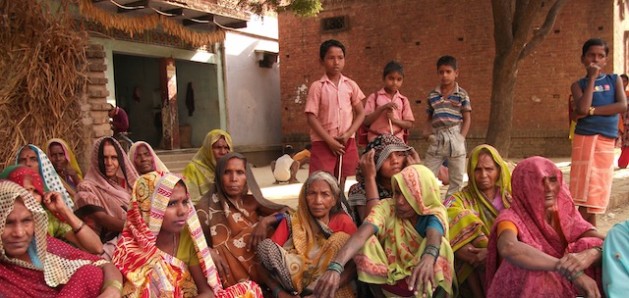A Culture of Impunity
Women in the north Indian village of Katra Shadatganj in the state of Uttar Pradesh,

CHIRANG(IPS): On a bright March morning, a 17-year old tribal girl woke as usual, and went to catch fish in the village river in the Chirang district of India’s northeastern Assam state.
Later that evening, villagers found her lifeless body on the riverbank. According to Taburam Pegu, the police officer investigating the case, her assailants had raped her before slitting her throat.
The girl was a member of the Bodo tribe, which has been at loggerheads with Muslims and Santhals – another indigenous group in the region. The tragic story reveals a terrible reality across India, where thousands of girls and women are sexually abused, tortured and murdered in a tide of gender-based violence (GBV) that shows no sign of slowing.
Conflict and a lack of accountability, particularly across India’s northern, eastern and central states where armed insurgencies and tribal clashes are a part of daily life for over 40 million women, fuel the fire of sexual violence.
According to a report released earlier this year by the United Nations Secretary-General assessing progress on the programme of action adopted at the 1994 International Conference on Population and Development (ICPD) in Cairo, violence against women is universal, with one in every three women (35 percent) experiencing physical or sexual abuse in her lifetime.
Of all the issues related to the ICPD action plan, ending gender-based violence was addressed as a key concern by 88 percent of all governments surveyed. In total, 97 percent of countries worldwide have programmes, policies or strategies to address gender equality, human rights, and the empowerment of women.
Still, multiple forms of violence against women continue to be an hourly occurrence all around the world.
A recent multi-country study on men and violence in the Asia-Pacific region, conducted by the United Nations, reported that nearly 50 percent of 10,000 men surveyed admitted to sexually or physically abusing a female partner.
In India, a country that has established a legal framework to address and end sexual violence, 92 women are raped every day, according to the latest records published by the government’s National Crime Records Bureau (NCRB).
This is higher than the average daily number of rapes reported in the Democratic Republic of the Congo, which currently stands at 36.
Sexual violence is particularly on the rise in conflict areas, experts say, largely due to a lack of accountability – the very thing the United Nations describes as “key to preventing and responding to gender-based violence.”
According to Suhas Chakma, director of the Asian Centre for Human Rights in New Delhi, “There are human rights abuses committed by security forces and human rights violations by the militants. And then there is also violence against women committed by civilians. No matter who is committing the crime […] there has to be accountability – a component completely missing” from the current legal framework.
An example of this is Perry*, a 35-year-old woman from the South Garo Hills district of India’s northeastern Meghalaya state – home to 14 million women and three armed groups – who was killed by militants in June this year.
Members of the Garo National Liberation Army (GNLA), an insurgent group, allegedly tried to rape Perry and, when she resisted, they shot her in the head, blowing it open. The GNLA refused to be held accountable, claiming that the woman was an informant and so “deserved to die”.
Another reason for the high levels of GBV in India is the dismal conviction rate – a mere 26 percent – in cases involving sexual assault and violence.
In 3,860 of the 5,337 rape cases reported in the past 10 years, the culprits were either acquitted or discharged by the courts for lack of ‘proper’ evidence, according to the NCRB.
“We have a culture of impunity,” Anjuman Ara Begum, a Guwahati-based lawyer and former programme officer at the Asian Human Rights Commission, told IPS, adding, “Our legal system itself negates the possibility or certainty of punishment in cases of violence against women.”
With a declining conviction rate, armed groups have been playing the role of the judiciary to deliver instant justice. In October 2011, a kangaroo court of the armed Maoists in the Palamu district of India’s eastern Jharkhand state cut off the hands of a man accused of rape.
In August 2013, the Kangleipak Communist Party (KCP) – an insurgent group operating in the northeastern state of Manipur – launched an “anti-rape task force”.
Sanakhomba Meitei, the secretary of KCP, told IPS over the phone that his group would deliver fast-track justice for rape victims. “Our intervention [will] instill fear in the [minds of the] rapists,” said Meitei, adding, “We will deliver stringent punishment.”
This is a worrying trend, but inevitable, given the failure of the legal system to deliver justice in these troubled areas, according to A L Sharada, director of Population First – a partner of the United Nations Population Fund (UNFPA) in India.
“What we need is a robust legal system, and mob justice hurts that possibility. In fact, such non-judicial justice systems are also very patriarchal in nature and ultimately against women. What we really need are quick convictions [in] every case of gender violence that has been filed,” Sharada stated.
According to the NCRB over 50,000 women were abducted across the country in 2013 alone, while over 8,000 were killed in dowry-related crimes. More than 100,000 women faced cruelty at the hands of their husbands or other male relatives, but only 16 percent of those accused were convicted.
*Not her real name
This story originally appeared in a special edition TerraViva, ‘ICPD@20: Tracking Progress, Exploring Potential for Post-2015’, published with the support of UNFPA, the United Nations Population Fund. The contents are the independent work of reporters and authors.
(INTER PRESS SERVICE)



